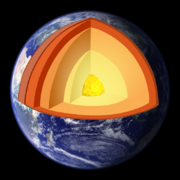Difference between revisions of "Material/Twenty most abundant elements in Earth's crust"
From AdCiv
< Material
| (28 intermediate revisions by one other user not shown) | |||
| Line 1: | Line 1: | ||
| − | Approx figures for the 20 most abundant elements in Earth's crust:< | + | <small>Approx figures for the 20 most abundant elements in Earth's crust:</small> |
| − | [[Image:Pariah canyon.jpg| | + | |
| + | [[Image:Pariah canyon.jpg|180px|right|Earth's crust]] | ||
| + | [[Image:Earth.png|180px|right|Earth cutaway]] | ||
{| | {| | ||
! style="background:#E5E5E5;" width="150px" align="left" | Element !! style="background:#E5E5E5;" width="80px" align="right" | % mass | ! style="background:#E5E5E5;" width="150px" align="left" | Element !! style="background:#E5E5E5;" width="80px" align="right" | % mass | ||
|- | |- | ||
| − | | Oxygen|| align = "right" | 46.71 | + | | {{wp4|Oxygen}}|| align = "right" | 46.71 |
|- | |- | ||
| − | | Silicon|| align = "right" | 27.69 | + | | {{wp4|Silicon}}|| align = "right" | 27.69 |
|- | |- | ||
| − | | Aluminum|| align = "right" | 8.07 | + | | {{wp4|Aluminum}}|| align = "right" | 8.07 |
|- | |- | ||
| − | | Iron|| align = "right" | 5.05 | + | | {{wp4|Iron}}|| align = "right" | 5.05 |
|- | |- | ||
| − | | Calcium|| align = "right" | 3.65 | + | | {{wp4|Calcium}}|| align = "right" | 3.65 |
|- | |- | ||
| − | | Sodium|| align = "right" | 2.75 | + | | {{wp4|Sodium}}|| align = "right" | 2.75 |
|- | |- | ||
| − | | Potassium|| align = "right" | 2.58 | + | | {{wp4|Potassium}}|| align = "right" | 2.58 |
|- | |- | ||
| − | | Magnesium|| align = "right" | 2.08 | + | | {{wp4|Magnesium}}|| align = "right" | 2.08 |
|- | |- | ||
| − | | Titanium|| align = "right" | 0.62 | + | | {{wp4|Titanium}}|| align = "right" | 0.62 |
|- | |- | ||
| − | | Hydrogen|| align = "right" | 0.14 | + | | {{wp4|Hydrogen}}|| align = "right" | 0.14 |
|- | |- | ||
| − | | Phosphorus|| align = "right" | 0.13 | + | | {{wp4|Phosphorus}}|| align = "right" | 0.13 |
|- | |- | ||
| − | | Carbon|| align = "right" | 0.09 | + | | {{wp4|Carbon}}|| align = "right" | 0.09 |
|- | |- | ||
| − | | Manganese|| align = "right" | 0.09 | + | | {{wp4|Manganese}}|| align = "right" | 0.09 |
|- | |- | ||
| − | | Sulfur|| align = "right" | 0.05 | + | | {{wp4|Sulfur}}|| align = "right" | 0.05 |
|- | |- | ||
| − | | Barium|| align = "right" | 0.05 | + | | {{wp4|Barium}}|| align = "right" | 0.05 |
|- | |- | ||
| − | | Chlorine|| align = "right" | 0.05 | + | | {{wp4|Chlorine}}|| align = "right" | 0.05 |
|- | |- | ||
| − | | Chromium|| align = "right" | 0.04 | + | | {{wp4|Chromium}}|| align = "right" | 0.04 |
|- | |- | ||
| − | | Fluorine|| align = "right" | 0.03 | + | | {{wp4|Fluorine}}|| align = "right" | 0.03 |
|- | |- | ||
| − | | Zirconium|| align = "right" | 0.03 | + | | {{wp4|Zirconium}}|| align = "right" | 0.03 |
|- | |- | ||
| − | | Nickel|| align = "right" | 0.02 | + | | {{wp4|Nickel}}|| align = "right" | 0.02 |
|} | |} | ||
| + | |||
| + | |||
| + | Notable missing from top 20: | ||
| + | {{wp4|Copper}}.<br><small>Carbon might replace copper for many electrical (and thermal) conduction applications - see [http://www.unidym.com/technology/cnt_property_electrical.html], [http://www.scienceblog.com/cms/ub-engineers-prove-carbon-nanotubes-are-superior-metals-electronics-19679.html] and {{wp|Carbon_nanotube|carbon nanotube}} for further information. In September 2013, a proof-of-concept computer was built from carbon nanotubes [http://www.kurzweilai.net/a-first-stanford-engineers-build-basic-computer-using-carbon-nanotubes]</small> | ||
| + | |||
<font size=1>''Figures from [http://www.science.co.il/PTelements.asp?s=Earth]''<br> | <font size=1>''Figures from [http://www.science.co.il/PTelements.asp?s=Earth]''<br> | ||
''Figures rounded to two decimal places''<br> | ''Figures rounded to two decimal places''<br> | ||
| − | ''Also need to have a list based on ease of extraction and energy required''</font> | + | ''Also need to have a list based on ease of extraction and energy required''<br> |
| + | ''Element links in list point to element's Wikipedia article''</font> | ||
Latest revision as of 21:42, 29 September 2013
Approx figures for the 20 most abundant elements in Earth's crust:
| Element | % mass |
|---|---|
| Oxygen | 46.71 |
| Silicon | 27.69 |
| Aluminum | 8.07 |
| Iron | 5.05 |
| Calcium | 3.65 |
| Sodium | 2.75 |
| Potassium | 2.58 |
| Magnesium | 2.08 |
| Titanium | 0.62 |
| Hydrogen | 0.14 |
| Phosphorus | 0.13 |
| Carbon | 0.09 |
| Manganese | 0.09 |
| Sulfur | 0.05 |
| Barium | 0.05 |
| Chlorine | 0.05 |
| Chromium | 0.04 |
| Fluorine | 0.03 |
| Zirconium | 0.03 |
| Nickel | 0.02 |
Notable missing from top 20:
Copper.
Carbon might replace copper for many electrical (and thermal) conduction applications - see [1], [2] and carbon nanotube  for further information. In September 2013, a proof-of-concept computer was built from carbon nanotubes [3]
for further information. In September 2013, a proof-of-concept computer was built from carbon nanotubes [3]
Figures from [4]
Figures rounded to two decimal places
Also need to have a list based on ease of extraction and energy required
Element links in list point to element's Wikipedia article

